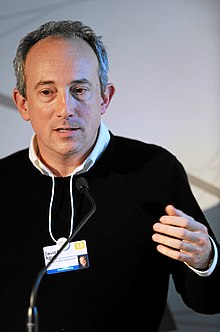David Agus
| David Agus | |
|---|---|

Agus at the World Economic Forum Annual Meeting in 2013
|
|
| Born |
January 29, 1965 Baltimore, Maryland, U.S. |
| Residence | California |
| Citizenship | American |
| Nationality | American |
| Fields |
Personal genomics, Biotechnology, Cancer |
| Institutions | Navigenics, University of Southern California, CBS News |
| Known for | Professor of Medicine and Engineering, University of Southern California, co-founder of Navigenics, co-founder of Applied Proteomics, New York Times #1 Bestselling author of The End of Illness and A Short Guide to a Long Life, and a CBS News contributor. |
David Agus (born January 29, 1965) is an American physician and a New York Times bestselling author. He is a Professor of Medicine and Engineering at the University of Southern California. He is co-founder of Navigenics, a personalized medicine company and Applied Proteomics, as well as a CBS News contributor.
He graduated cum laude in molecular biology from Princeton University in 1987 and received his medical degree from the University of Pennsylvania Perelman School of Medicine in 1991. Agus completed his residency training at Johns Hopkins Hospital and completed his oncology fellowship training at Memorial Sloan-Kettering Cancer Center in New York. He spent two years at the National Institutes of Health as a Howard Hughes Medical Institute-NIH Research Scholar.
Agus has had a long and varied career. At the Memorial Sloan-Kettering Cancer Center in New York, he was an attending physician in the Department of Medical Oncology and head of the Laboratory of Tumor Biology. He was also Assistant Professor of Medicine at Cornell University Medical Center.
As director of the Spielberg Family Center for Applied Proteomics at Cedars-Sinai Medical Center in Los Angeles, he led a multidisciplinary team of researchers dedicated to the development and use of proteomic technologies to guide doctors in making health-care decisions tailored to individual needs. The center grew out of earlier clinical projects at Cedars-Sinai, where Agus served as an attending physician in oncology, which showed striking differences between the aggressiveness of prostate cancer in certain patients and their ability to respond to treatment.
...
Wikipedia
